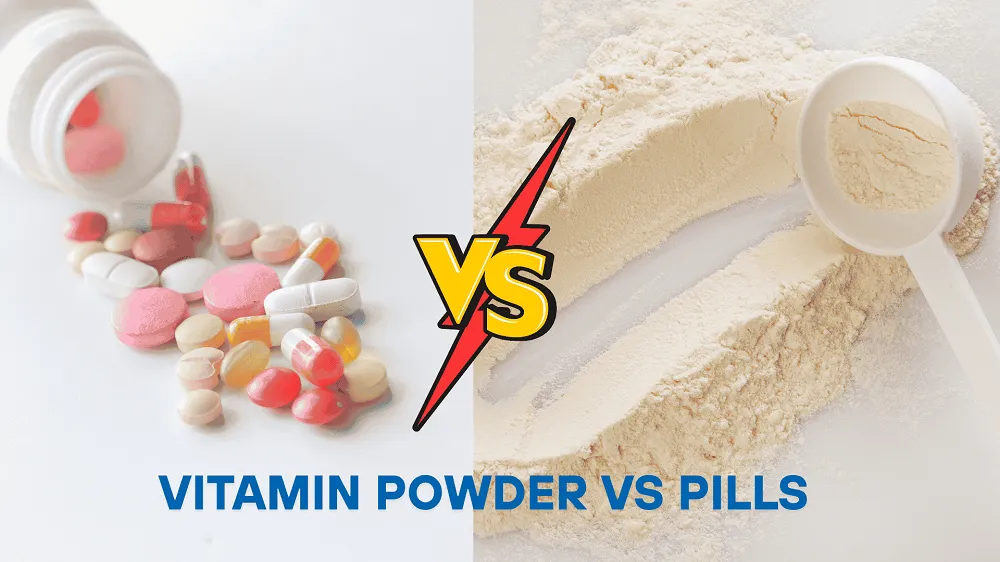Introduction
In today’s fast-paced world, vitamin supplementation has become an integral part of maintaining optimal health and wellness. As our modern lifestyles often leave us with nutritional gaps, millions of people worldwide turn to vitamin supplements to bridge these deficiencies and support their overall well-being. The global vitamin and mineral supplements market continues to expand, reflecting our growing awareness of the importance of proper nutrition in disease prevention and health optimization.
However, as the supplement industry evolves, consumers face an increasingly complex decision: should they choose vitamin powders or traditional pills? This fundamental question goes beyond simple preference, touching on factors that can significantly impact the effectiveness of supplementation efforts. The choice between powder and pill forms involves considerations of absorption efficiency, convenience, cost-effectiveness, and individual lifestyle needs.

This comprehensive analysis will explore the key differences between vitamin powders and pills, examining their respective advantages and limitations across multiple dimensions. We’ll investigate absorption rates, convenience factors, cost considerations, storage requirements, and suitability for different populations. By the end of this article, readers will have the knowledge necessary to make an informed decision about which supplement form best aligns with their health goals and lifestyle preferences.
Basic Overview of Vitamin Powders and Pills
Vitamin Powders
Vitamin powders represent a versatile and increasingly popular form of nutritional supplementation. These products are created by converting vitamins and other essential nutrients into a fine powder form that can be easily dissolved in liquids or incorporated into food. The powder format offers unique advantages in terms of flexibility and customization, allowing users to adjust serving sizes and combine supplements with their preferred beverages or meals.
Common forms of vitamin powders include single-nutrient options such as vitamin C powder, which provides high concentrations of ascorbic acid in a pure form, and complex nutritional blends that combine multiple vitamins, minerals, and other beneficial compounds. These multi-ingredient formulations often target specific health goals, such as immune support, energy enhancement, or post-workout recovery.
The typical usage methods for vitamin powders involve dissolving them in water, fruit juices, smoothies, or protein shakes. Many users appreciate the ability to mask any unpleasant tastes by mixing powders with flavored beverages or incorporating them into recipes. Popular examples include electrolyte powders for hydration support, collagen peptide powders enhanced with vitamins for skin health, and green superfood powders that combine vitamins with plant-based nutrients.

Vitamin Pills
Vitamin pills, encompassing tablets, capsules, and softgels, represent the traditional and most widely recognized form of dietary supplementation. These products are manufactured by compressing or encapsulating active ingredients into convenient, pre-measured doses that can be easily swallowed. The pill format has dominated the supplement market for decades due to its stability, portability, and standardized dosing.
The variety of pill forms includes hard tablets, which are compressed mixtures of active ingredients and binding agents; capsules, which contain powder or liquid ingredients within a gelatin or vegetarian shell; and softgels, which typically house oil-based nutrients in a soft, chewable casing. Each format offers specific advantages depending on the type of nutrient being delivered and the intended absorption profile.
Common examples of vitamin pills include daily multivitamin tablets that provide comprehensive nutritional support, single-nutrient capsules such as vitamin D3 softgels for bone health, and specialized formulations like fish oil capsules for omega-3 fatty acid supplementation. The convenience of pill forms makes them particularly suitable for busy lifestyles, travel, and situations where precise dosing is crucial.
Comparative Analysis
Absorption Efficiency
The bioavailability of vitamins – their ability to be absorbed and utilized by the body – represents one of the most critical factors in supplement effectiveness. Vitamin powders generally demonstrate superior absorption characteristics compared to their pill counterparts, primarily due to their pre-dissolved state and increased surface area for interaction with digestive enzymes.
When vitamin powders are dissolved in liquid, they bypass the initial breakdown phase required for solid supplements, allowing for more immediate contact with the intestinal walls where absorption occurs. This advantage is particularly pronounced for water-soluble vitamins such as vitamin C and B-complex vitamins, which can be rapidly absorbed when presented in liquid form. Research indicates that liquid supplements can achieve bioavailability rates 85-95% higher than traditional tablet forms.
Pills, conversely, must undergo a dissolution process in the stomach before their active ingredients become available for absorption. This process can be influenced by factors such as stomach pH, the presence of food, and individual digestive capacity. Hard tablets, in particular, may require 20-30 minutes for complete dissolution, during which time some nutrients may be degraded by stomach acid or pass through the system without being fully absorbed.
The coating and binding agents used in pill manufacturing can also impact absorption efficiency. While these components are necessary for product stability and manufacturing feasibility, they may create additional barriers to nutrient release. However, advances in pharmaceutical technology have led to the development of enteric coatings and timed-release formulations that can enhance absorption for specific nutrients.
Convenience and Practicality
The convenience factor plays a crucial role in supplement adherence and long-term success. Vitamin powders offer unique advantages in terms of flexibility and customization, allowing users to adjust serving sizes according to their specific needs and preferences. This adaptability is particularly valuable for individuals who require varying doses based on activity levels, seasonal changes, or specific health goals.
However, powder supplements require preparation time and access to suitable liquids or foods for mixing. This requirement can be inconvenient during travel, busy work schedules, or situations where discretion is preferred. The need for measuring tools and mixing containers adds complexity to the supplementation routine and may deter some users from maintaining consistent intake.
Pills excel in convenience and portability, offering a grab-and-go solution that fits seamlessly into busy lifestyles. The pre-measured doses eliminate guesswork and ensure consistent nutrient intake, while the compact size makes them ideal for travel and storage in purses, desk drawers, or gym bags. The ability to take pills discreetly in any setting without preparation makes them particularly appealing to working professionals and frequent travelers.
The swallowing factor presents a significant consideration for certain populations. While most adults can easily swallow pills, children, elderly individuals, and those with swallowing difficulties may struggle with this delivery method. Conversely, powders can be easily incorporated into foods and beverages, making them more accessible for these groups.
Taste and Personalization
Taste preferences and the ability to customize the supplementation experience represent important factors in long-term adherence. Vitamin powders offer superior flexibility in this regard, allowing users to mask unpleasant flavors by mixing with preferred beverages or incorporating into recipes. Many powder formulations are available in appealing flavors such as berry, citrus, or vanilla, making the supplementation experience more enjoyable.
The ability to blend powders with smoothies, protein shakes, or other beverages creates opportunities for nutritional synergy and can help individuals meet multiple health goals simultaneously. This integration capability is particularly valuable for athletes and health-conscious individuals who maintain elaborate nutrition routines.
Pills typically offer a neutral taste experience, as the active ingredients are contained within coatings or capsules that mask flavors during swallowing. However, some individuals may experience aftertastes, particularly with certain oil-based supplements or high-potency formulations. The lack of customization options means that users must accept the predetermined formulation without modification.
Cost Considerations
The financial aspect of supplementation can vary significantly between powder and pill formats, influenced by factors such as manufacturing processes, packaging requirements, and market positioning. Powder supplements often provide better value per serving, as the manufacturing process is generally less complex and requires fewer specialized materials than pill production.
The ability to purchase larger quantities of powder supplements can result in lower per-dose costs, particularly for frequently used nutrients like vitamin C or protein powders. However, the packaging requirements for powders, including moisture-resistant containers and protective sealing, can add to the overall product cost.
Pills benefit from established manufacturing processes and economies of scale, resulting in relatively stable pricing across different brands and formulations. The standardized nature of pill production allows for efficient mass manufacturing, though premium formulations with specialized coatings or delivery systems can command higher prices.
Market research indicates that the cost per serving can vary by 30-50% between powder and pill formats of the same nutrient, with powders generally offering better value for high-dose requirements and pills providing competitive pricing for standard maintenance doses.
Storage and Stability
The storage requirements and product stability represent crucial factors in maintaining supplement potency and safety. Vitamin powders generally require more careful storage conditions to maintain their effectiveness and prevent degradation. Exposure to moisture, light, and air can significantly impact powder stability, potentially leading to clumping, nutrient degradation, and reduced shelf life.
Proper storage of powder supplements requires airtight containers, cool temperatures, and protection from humidity. Many powders include desiccant packets or require refrigeration after opening to maintain potency. The larger surface area of powdered nutrients makes them more susceptible to oxidation and environmental factors compared to encapsulated forms.
Pills demonstrate superior stability characteristics, with hard tablets and capsules providing protective barriers against environmental factors. The compressed or encapsulated format shields nutrients from air, moisture, and light, resulting in longer shelf lives and more predictable potency retention. Most pill supplements can be stored at room temperature in standard medicine cabinets without significant degradation.
The stability advantage of pills makes them particularly suitable for emergency preparedness, travel, and situations where storage conditions cannot be carefully controlled. This reliability factor contributes to their popularity among users who prioritize convenience and predictable results.
Target Populations and Use Cases
Optimal Scenarios for Vitamin Powders
Vitamin powders excel in specific situations and for particular user groups who can maximize their unique advantages. Athletes and fitness enthusiasts represent a primary target demographic, as powders can be easily incorporated into pre- and post-workout nutrition routines. The ability to combine electrolytes, vitamins, and other performance-supporting nutrients in a single drink makes powders particularly valuable for sports nutrition applications.
Children and elderly individuals who struggle with swallowing pills can benefit significantly from powder formulations. The ability to mix supplements into familiar foods like yogurt, applesauce, or smoothies makes nutrition supplementation more accessible and enjoyable for these populations. Parents particularly appreciate the flexibility to adjust doses based on their children’s age, weight, and nutritional needs.
Individuals with digestive sensitivities or conditions that affect nutrient absorption may find powders more suitable due to their enhanced bioavailability. The pre-dissolved state of powder supplements can be easier on sensitive stomachs and may provide better therapeutic outcomes for those with compromised digestive function.
Creative cooking enthusiasts and health-conscious individuals who enjoy experimenting with nutrition can leverage powders’ versatility to create customized health drinks, energy balls, and nutritious recipes. This integration capability allows for seamless incorporation of supplements into existing dietary patterns.
Optimal Scenarios for Vitamin Pills
Pills prove most suitable for busy professionals, frequent travelers, and individuals who prioritize convenience and consistency in their supplementation routine. The grab-and-go nature of pills aligns perfectly with hectic schedules and unpredictable daily routines, ensuring that nutritional goals aren’t compromised by time constraints or location changes.
Elderly individuals who are comfortable with pill swallowing and prefer simplified routines often find pills more manageable than powders. The pre-measured doses eliminate confusion and reduce the risk of dosing errors, which can be particularly important for those managing multiple health conditions or medications.

Individuals requiring precise nutrient dosing for specific health conditions benefit from the standardized nature of pill supplements. The consistent potency and controlled release characteristics of pills provide predictable therapeutic outcomes that may be crucial for certain medical applications.
Privacy-conscious users who prefer discreet supplementation find pills ideal, as they can be taken quickly and quietly in any setting without drawing attention or requiring preparation. This discretion factor is particularly valuable in professional or social environments where elaborate nutrition routines might be impractical.
Potential Risks and Considerations
Powder-Specific Concerns
While vitamin powders offer numerous advantages, they also present unique risks and considerations that users must understand. The ease of adjusting serving sizes, while beneficial for customization, can lead to unintentional overconsumption if users don’t carefully measure doses. The “more is better” mentality can result in excessive intake of certain nutrients, particularly fat-soluble vitamins that can accumulate in the body.
Hygiene and contamination risks represent another concern with powder supplements. The repeated opening and closing of containers, exposure to moisture during mixing, and potential cross-contamination with other supplements or foods can compromise product integrity. Users must maintain strict hygiene practices and proper storage conditions to minimize these risks.
The mixing process itself can introduce variables that affect nutrient stability and absorption. Combining powders with acidic beverages, hot liquids, or certain foods may alter the chemical structure of sensitive nutrients, potentially reducing their effectiveness. Understanding proper mixing techniques and compatible beverages is essential for optimal results.
Pill-Specific Concerns
Pills, while generally safer in terms of dosing accuracy, present their own set of considerations. The standardized nature of pills can make it difficult to adjust doses for individual needs, potentially leading to under- or over-supplementation. Users with specific nutritional requirements may find it challenging to achieve optimal levels with fixed-dose formulations.
The presence of fillers, binders, and coating agents in pills can cause adverse reactions in sensitive individuals. These inactive ingredients, while necessary for manufacturing, may trigger allergies or digestive issues in some users. Reading labels carefully and choosing products with minimal additives is crucial for those with sensitivities.
The delayed absorption characteristic of pills can be problematic for nutrients that are best absorbed at specific times or in particular states. For example, some vitamins are more effective when taken with food, while others are better absorbed on an empty stomach. The rigid nature of pill formulations may not always align with optimal absorption timing.
Real-World Applications and User Feedback
Consumer Experiences and Preferences
Real-world usage patterns reveal interesting insights into how different populations approach vitamin supplementation. Fitness enthusiasts and athletes consistently favor powder formulations for their post-workout nutrition routines, citing the ability to combine multiple supplements into a single drink as a major advantage. Social media platforms, particularly fitness-focused communities, showcase creative recipes and combinations that maximize the versatility of powder supplements.
Healthcare workers and busy professionals tend to gravitate toward pill formats due to their compatibility with irregular schedules and demanding work environments. The ability to maintain consistent supplementation without requiring preparation time or special equipment makes pills particularly appealing to these high-stress populations.
Age-related preferences show clear patterns, with younger demographics more willing to experiment with powder formulations and flavor combinations, while older adults often prefer the simplicity and familiarity of traditional pills. This generational divide reflects broader attitudes toward nutrition and supplementation approaches.
Social Media Trends and Discussions
Analysis of social media discussions reveals evolving attitudes toward supplement formats and their integration into daily routines. Platforms like Instagram and TikTok showcase elaborate morning routines featuring colorful powder blends and creative mixing techniques, reflecting the aesthetic appeal and customization possibilities of powder supplements.
Professional health influencers and registered dietitians often emphasize the importance of bioavailability and absorption efficiency, lending credibility to powder formulations’ scientific advantages. However, they also stress the importance of consistency and adherence, acknowledging that the “best” supplement is the one that individuals will actually take consistently.
Consumer reviews and testimonials highlight the practical realities of different supplement formats. Users frequently mention convenience factors, taste preferences, and lifestyle compatibility as primary decision-making criteria, often outweighing purely scientific considerations.
Conclusion
The choice between vitamin powders and pills ultimately depends on individual preferences, lifestyle factors, and specific health goals. Powders excel in areas of absorption efficiency, customization flexibility, and integration with existing nutrition routines. Their superior bioavailability and ability to be tailored to individual needs make them particularly valuable for athletes, individuals with absorption issues, and those who enjoy experimenting with their nutrition.
Pills offer unmatched convenience, portability, and consistency, making them ideal for busy lifestyles, travel, and situations where precise dosing is crucial. Their stability, ease of use, and widespread availability make them a practical choice for the majority of supplement users who prioritize simplicity and reliability.
Rather than viewing these formats as mutually exclusive, many successful supplement users employ a hybrid approach, using powders for specific situations (such as post-workout recovery) while relying on pills for daily maintenance supplementation. This strategy maximizes the advantages of both formats while minimizing their respective limitations.
The key to successful supplementation lies not just in choosing the right format, but in selecting high-quality products from reputable manufacturers, following appropriate dosing guidelines, and maintaining consistent usage patterns. Regardless of the chosen format, consulting with healthcare professionals or registered dietitians can provide personalized guidance based on individual health status, dietary patterns, and specific nutritional needs.
As the supplement industry continues to evolve, new formulations and delivery methods are emerging that may bridge the gap between traditional powders and pills. However, understanding the fundamental differences between these established formats provides a solid foundation for making informed decisions about personal supplementation strategies.
References and Further Reading
For those interested in exploring the scientific foundations of supplement absorption and bioavailability, the National Institutes of Health (NIH) Office of Dietary Supplements provides comprehensive fact sheets on individual nutrients and their absorption characteristics. The Mayo Clinic’s nutrition and healthy living section offers evidence-based guidance on supplement selection and usage.
Academic research on supplement bioavailability can be found in journals such as the American Journal of Clinical Nutrition, the Journal of Nutrition, and Nutrients. These peer-reviewed publications provide detailed studies on the comparative effectiveness of different supplement formats and their clinical applications.
For real-time discussions and updates on supplement trends, following registered dietitians and nutrition researchers on social media platforms can provide valuable insights into emerging research and practical applications. Professional organizations such as the Academy of Nutrition and Dietetics and the International Society of Sports Nutrition offer evidence-based resources for both consumers and healthcare professionals.
Staying informed about supplement science and industry developments empowers consumers to make educated decisions about their nutritional supplementation strategies, ultimately supporting their long-term health and wellness goals.
